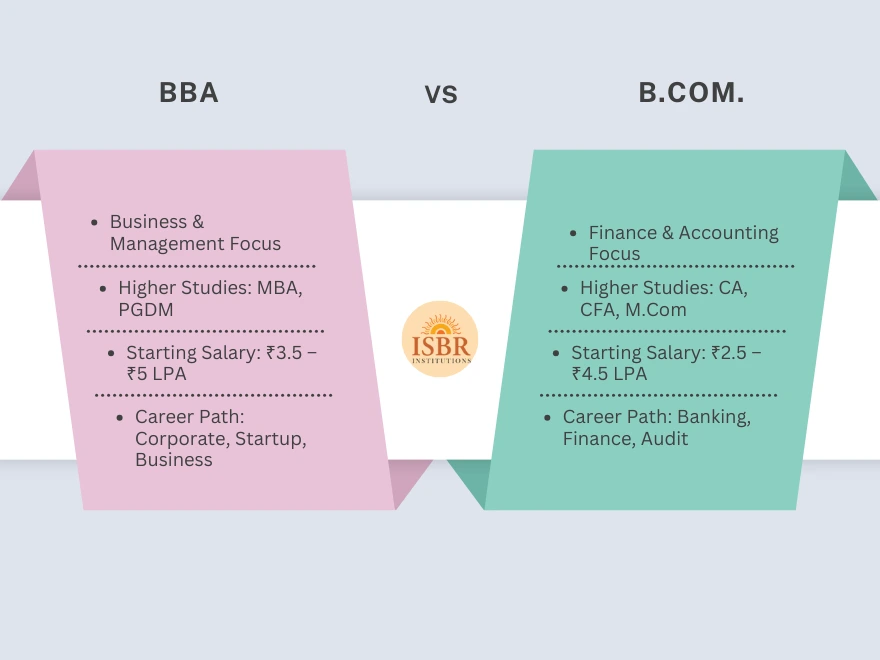Choosing between BBA (Bachelor of Business Administration) and B.Com (Bachelor of Commerce) is a major decision for commerce students planning their future. Both undergraduate programs offer valuable career opportunities, but they cater to different interests and career paths.
This blog explores the core differences, benefits, salary prospects, and career scope of both BBA and B.Com, helping you make an informed decision based on your goals.
What is BBA?
Bachelor of Business Administration (BBA) is a 3-year undergraduate degree that focuses on business management, entrepreneurship, and administration. The curriculum is designed to give students a practical understanding of how businesses operate.
Key Subjects Covered in BBA:
- Principles of Management
- Marketing
- Financial Management
- Human Resources Management
- Business Strategy
- Organizational Behavior
Specializations Offered in BBA:
BBA is an excellent choice for students interested in working in corporate roles or starting their own businesses. It also provides a strong foundation for pursuing an MBA later.
What is B.Com?
Bachelor of Commerce (B.Com) is a 3-year undergraduate degree focused on commerce, accounting, taxation, and economics. It is more theory-based compared to BBA and is ideal for students who want to build a career in accounting, finance, or pursue professional courses such as CA or CFA.
Key Subjects Covered in B.Com:
- Financial Accounting
- Corporate Accounting
- Taxation
- Auditing
- Business Law
- Economics
Specializations Offered in B.Com:
B.Com is particularly beneficial for students aiming for professional certifications or higher education in commerce and finance.
BBA vs. B.Com
| Feature | BBA | B.Com |
|---|---|---|
| Duration | 3 Years | 3 Years |
| Focus Area | Business Management, Entrepreneurship | Finance, Accounting, Economics |
| Learning Approach | Practical, industry-oriented | Theoretical, concept-driven |
| Best For | Aspiring managers, business leaders | Future accountants, finance professionals |
| Higher Studies Path | MBA, PGDM | CA, CFA, M.Com, MBA |
| Top Recruiters | Infosys, Deloitte, Amazon, Startups | EY, PwC, KPMG, Banks |
Career Opportunities After BBA and B.Com
Career Options After BBA:
- Business Development Executive
- Human Resources Manager
- Marketing Executive
- Operations Manager
- Entrepreneur
- Financial Analyst
- Management Trainee
Career Options After B.Com:
- Accountant
- Tax Consultant
- Financial Analyst
- Auditor
- Investment Banker
- Banking Officer
- CA/CFA Professional
Both programs open doors to varied opportunities, but the nature of roles will differ. BBA leads to management and business roles, while B.Com paves the way for finance and accounting careers.
Higher Studies: MBA, CA, CFA – Which Course Aligns Better?
- BBA to MBA: BBA provides a solid base for MBA aspirants by covering fundamental management topics early on. Many students use BBA as a stepping stone toward specialized management degrees.
- B.Com to CA/CFA: Students pursuing B.Com often continue with professional certifications like CA (Chartered Accountancy), CFA (Chartered Financial Analyst), or M.Com. The B.Com curriculum is aligned with these exams and provides the required theoretical depth.
Your choice should depend on your future study goals. If you see yourself as a manager or entrepreneur, BBA is ideal. If your interests lie in finance, numbers, or accounting, B.Com is a better fit.
Salary Comparison: BBA vs. B.Com
| Career Level | Average Salary After BBA (INR) | Average Salary After B.Com (INR) |
|---|---|---|
| Entry Level | 3.5 – 5 LPA | 2.5 – 4.5 LPA |
| Mid-Level | 6 – 10 LPA | 5 – 8 LPA |
| Senior Level | 10 – 20+ LPA | 12 – 25+ LPA (with CA/CFA) |
Note: Salaries depend on job role, location, industry, and qualifications.
Which One Should You Choose?
Choose BBA if you:
- Want to start a career in business or management
- Plan to pursue an MBA in the future
- Are interested in leadership, strategy, and entrepreneurship
- Prefer a practical learning approach
Choose B.Com if you:
- Enjoy working with numbers, accounts, and data
- Plan to pursue CA, CFA, or other professional commerce qualifications
- Want a career in auditing, taxation, or finance
- Prefer a traditional and academic approach
Why Choose ISBR for Your BBA?
ISBR Business School is one of India’s leading management institutions, offering a dynamic BBA program tailored to meet the demands of the modern business world.
Key Features of ISBR’s BBA Program:
- Industry-integrated curriculum
- Expert faculty from top institutions
- Exposure to live projects, internships, and corporate visits
- 100% placement assistance
- Options for global exchange and entrepreneurship incubation
Conclusion
Both BBA and B.Com are valuable undergraduate degrees that offer diverse career paths. The right course for you depends on your personal interests and long-term goals.
- If you’re looking for a career in business leadership, entrepreneurship, or corporate roles, BBA is the right path.
- If you’re inclined toward finance, accounting, or professional commerce certifications, B.Com will suit you better.
Choose wisely based on your strengths, aspirations, and desired career direction. And most importantly, choose a college that empowers your growth and prepares you for the real world.
Explore ISBR’s BBA program today and take the first step toward a successful career.

